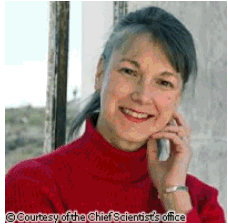|
|
|
|
|
|
|
News & Views item - January 2009 |
![]() Chief Scientist Launches Year of Astronomy and Fronts the Media in Europe.
(January 28, 2009)
Chief Scientist Launches Year of Astronomy and Fronts the Media in Europe.
(January 28, 2009)
 Australia's Chief Scientist, Australian National University Professor, Penny
Sackett hopped over to Paris a couple of weeks ago to take part in the official
opening of the
International Year of Astronomy. Despite the fact that Professor
Sackett has been bordering on invisibility as far as the Australian media,
popular or otherwise, are concerned she gave a couple of interviews while in
Europe.
Australia's Chief Scientist, Australian National University Professor, Penny
Sackett hopped over to Paris a couple of weeks ago to take part in the official
opening of the
International Year of Astronomy. Despite the fact that Professor
Sackett has been bordering on invisibility as far as the Australian media,
popular or otherwise, are concerned she gave a couple of interviews while in
Europe.
Here are some excerpts:
First from CORDIS, the European Commission's Community Research and Development Information Service which spent several paragraphs developing a thumbnail biography:
"I think we need to have teachers that are themselves excited about science. I think that may be one of the most critical issues. It can even surmount inadequate resources in other areas - not that I want to suggest that one should make do with inadequate resources, but I think the most important resource is the teacher."
CordisNews continued:
The problem is that in many countries, not only are fewer people studying science, but fewer of the best young scientists are going into teaching, creating a vicious cycle which makes it even harder to attract young people to science.
Professor Sackett is keen to work closely with international partners to share experiences and ideas on how to remedy this issue. "Fundamentally, I think we need to value teachers, and that may mean different things to different people in different cultures," she explained, adding that this could mean salaries, public recognition and greater freedom in teaching styles.
As well as participating in the opening ceremony of the International Year of Astronomy, Professor Sackett's trip to Europe also involved discussions with the European Commission about future EU-Australia research collaboration. The EU and Australia have been working closely together on a number of issues since 1994, and there are now plans afoot to create a joint research roadmap for areas where the two regions' priorities overlap.
Professor Sackett also gave an extensive interview to EurActiv which
has reported on European Union affairs for the past ten years. Below are
excerpts taken from the 1,900 word interview. She opened with:
from the 1,900 word interview. She opened with:
[With regard to anthropogenic effects on climate change] it is not really for Australia to teach Europe lessons on sustainability, but sustainability is of crucial importance for Australia and one of the reasons why is that global challenges such as climate change will affect Australia more than any other countries.
In fact, Australia is facing the effects of some of these problems already today. So maybe it is that we will gain experience that might be useful for researchers and other countries as they begin to plan for mitigating against and adapting to climate change.
Would you say Australia's research focus is different to that of Europe?
Every country adapts particular pieces of its research agenda to suit its own nationís problems. In Australia, for example, water is very much a priority, understanding how we can maintain and, in fact, even improve our water security, learning how to make crops that are suitable for a climate that often experiences drought, investing in renewable energies, particularly solar energy, and even thinking about deep thermal energy. But, on the other hand, more and more of the issues that we face are those faced around the globe.
Do you believe that cooperation between Europe and Australia can be
intensified?
Yes, I think that is certainly the case. [I believe we could] agree on
a road map, which will help to guide those areas where we expect to deepen our
cooperation and in areas where we were already working as well as probably
exploring some new areas where we can work together.
One of the main priorities of the new US administration will be to
assume leadership in fighting climate change. Do you think that this might
inspire the Australians to come on board too?
It would make a vital difference. [Our Prime Minister has said] Australia would
be prepared to raise [carbon] reduction to 15% if other countries can reach an
agreement and, of course, the participation of the United States is crucial.
Do you share Europe's worries about a so-called 'brain drain'?
Well, it is interesting. Most countries that I have lived in or had
close cooperation with are worried about brain drain. I wonder, in fact, if a
piece of this is because we are seeing more brain circulation, if I could call
it rather than a drain or a gain... I think at the same time the whole world
recognises there is the need for more people who are trained in science,
technology and engineering. As far as I can ascertain, what is also another
global problem is that precisely in a time when we are more reliant on science
and technology to help us understand and, indeed, react to some of challenges
that face us, we are seeing declining rates in many countries of young people
who are taking up those disciplines. I do hope that the global challenges
we face will inspire more young people to take up these fields and, indeed, to
travel and to exchange their ideas with young colleagues elsewhere in the world.
What do you think could be done to inspire young people and to
motivate them to go into science?
I think most young people want to live in a world they feel they can
influence and where they want to make a difference. Indeed, if that is something
that a young person feels is important, then science is where a single
individual can make a difference, perhaps [more than in] some other disciplines.
I think what we will witness new sorts of job opportunities... for example,
science and law. Certainly that would be a very valuable combination if we are
thinking about things such as carbon-trading schemes.
[Is]Australia... a step ahead [of Europe] when it comes to gender-mainstreaming in science? Do you think Europe could learn from Australia in this regard?
[W]e have seen rapid, positive change in Australia and I think that most countries could do better in ensuring that they are using all of [their] human potential... I think what we are seeing is a shift in that Australians are actually quite comfortable with this shift. So I am pleased with it and I would be pleased if every nation could use the full potential.